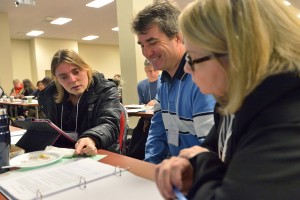
Brenda Prager, Jason Ritchie and Nancy Wiggers discuss a question during a workshop on teaching in STEM disciplines. Photo by Thomas Graning/Ole Miss Communications
OXFORD, Miss. – Aiming to reach new heights in their own instructional skills, some 70 University of Mississippi faculty members became students again Tuesday (Jan. 19).
The UM science, technology, engineering and mathematics professors were participants in a two-day professional development workshop at the university’s Jackson Avenue Center. Authors Richard Felder and Rebecca Brent of North Carolina State University conducted the training, which was co-sponsored by the university’s Center for Excellence in Teaching and Learning, Office of the Provost and Center for Math and Science Education.
“This workshop, which will focus on active teaching/learning techniques, is intended to support our plan to build a new STEM building by preparing our faculty to teach in the new and nontraditional spaces provided by this building,” said Nancy Rhea Wiggers, learning specialist in CETL.
“We have workshop registrants from biology, chemistry, physics, math, geological engineering, chemical engineering, mechanical engineering, computer science, civil engineering, electrical engineering, as well as a few faculty from the School of Education.”
“Traditional teaching spaces” refers to standard lecture rooms and auditoria, with students facing the instructor in fixed rows of chairs. Also, traditional teaching lab spaces would have long benches.
“Nontraditional teaching spaces” refers to designs where students sit at round tables, or where the seating is movable or where students can easily turn around to work in small groups. Nontraditional teaching labs would also have individual island benches, with students working in groups of two or four. A term for this design is a Technology Enabled Active Learning, or TEAL, classroom.
Participants in the workshop say the information will definitely help them improve their instruction of returning and future STEM students at Ole Miss.
“The basic idea is to move from lecturing to a more ‘active learning’ type of class, where students are given worksheets or projects to work on as a team,” said Maurice Eftink, associate provost and professor of chemistry and biochemistry.
“A reason for having these workshops is to prepare our faculty for the new STEM building, which should open in fall 2018 and which will have a number of these TEAL classrooms, as well as teaching labs and auditoria. Our faculty will need to be prepared, especially if they teach in the TEAL rooms, which will look more like a banquet room with large round tables and with lots of technology items.”
But the goal is for the STEM faculty to also include more active learning techniques in their current courses, even before the new building is ready.
“Active learning involves more engagement by both students and the instructor,” Eftink said. “Rather than just sitting and taking notes, which often are repetitive of PowerPoint handouts, a student in a course involving active learning will engage in more classroom discussion with classmates and the instructor and will learn through inquiry-based projects, more so than just listening to the instructor.”
Felder and Brent have presented more than 400 faculty development workshops throughout the U.S. and abroad on effective teaching, mentoring and faculty development. Their workshops, while intended primarily for participants in engineering and the physical, mathematical and biological sciences, cover techniques that apply to a wide range of disciplines.
The facilitators are the co-authors of “Teaching and Learning STEM: A Practical Guide” (Jossey-Bass, 2016). Felder is the Hoechst Celanese Professor Emeritus of Chemical Engineering at NCSU at Raleigh. He is also co-author of “Elementary Principles of Chemical Processes” (4th edition, Wiley, 2015), which since 1978 has been used as the introductory chemical engineering text by roughly 90 percent of American universities.
Brent is president of Education Designs Inc., a consulting firm in Cary, North Carolina. Her areas of expertise are faculty development in engineering and the sciences, evaluation of educational programs at both precollege and college levels, and classroom uses of instructional technology.